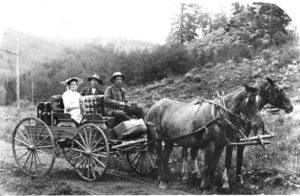
By Jan Wondra
The fallout from Chaffee County inserting itself into a neighbor conflict isn’t just a property owner who found herself homeless for Christmas, although that is exactly what happened. At its worst, this may be an example of a government over-reaching its authority. At the least, it is a county Grinch, which first stole Christmas, and continues its attempt to remove most of Alison Brown’s American foxhounds from her 80-acre rural property located at 11600 Antelope Road.
After selling her Salida house and building a new house on rurally-zoned property she has owned since 2014, Brown ended up with no home for Christmas because the county refused to give her an “OK to occupy.” The December 20 occupancy inspection by Head Inspector Aaron Kroschel revealed one, minor, exterior handrail issue. The handrail is two inches too low, not normally a cause to deny occupancy. But the inspection document says: “Note – when final is approved cannot give OK to occupy until a land use violation is resolved.” Kroschel told Brown that Chaffee County Development Director Dan Swallow had told him to deny occupancy.
“It isn’t as simple as the house, unfortunately,” said County Commissioner Dave Potts. “Because of the litigation I can’t go into it any more. For the details I am going to refer you to our county attorney.”
Swallow said, “If she’s in violation of other codes we are well within our rights to deny occupancy. We were planning to deny it because she is in violation of IRC2006 edition, code section R110.3. After the building official inspects the building, and finds no violation of that code …if there are other violations the code does allow us to revoke the occupancy.”
Brown, who has reduced the number of dogs in kennels on her property, says the county claims she is an outfitter, which she denies, and says its kennel definition is more strict than state definitions. Her attorney, Michael Scott, has been in negotiations with the county regarding its requirements. Per a November letter she agreed to apply for a limited impact review for outfitting, but not the kennels. The county says it will require both.
The occupancy denial relates to the temporary injunction filed by the county on December 12, requiring Brown to “cease housing dogs and horses for foxhunting purposes.”
“What have the dogs got to do with me being able to occupy a house – my home? This is vindictive,” said Brown. “I tried last summer to get the county to tell me how many dogs were allowed. Now suddenly – they’re objecting to the horses too. How can they tell me I can’t ride? I hunt on federal land.”
County Attorney Jennifer Davis said that isn’t exactly correct. “In the injunction we’re asking that she be enjoined from hunting operations, referring to the club activities. We’re not seeking that she not have horses there for her own use. She has admitted that she leases the horses out for hunting.”
Davis said although the county did go into mediation, “We still need her to go ahead with both the outfitting and kennel limited impact reviews. When someone is in violation of the land use code, it’s what we expect of everyone. We can’t negotiate the land use code. She got a building permit for the property, but nothing for a kennel permit. Building a residence isn’t building a kennel.”
The county action is separate from a civil and a criminal law suit filed in District court. A conflict began soon after Chris Vely and Laura Barton moved to the 40 acres next door to Alison Brown and complained about the sound of her hounds, according to Brown, taking sound readings right at the rural fence line. Neighbors lined up on both sides of the conflict. Brown asked for mediation by the county’s Right-to-Farm-and-Ranch Board. The county initially granted it, then withdrew approval.
Instead, a narrowing of the oversight scope of the county’s Right-to-Farm-and-Ranch Board ensued, a step in which the county attorney represented the changes she brought to the RTFAR as coming from the commissioners, and the next day represented the document to county commissioners as coming from the RTFAR board. The RTFAR board can now only mediate between those engaged in tax-status agricultural activity.
“My understanding of the board was to look at disputes between neighbors in rural area,” said RTFAR member Jim McConaghy. “But it has been redefined as being an entity that looks at disputes between only working ranchers. The board is different now; the county attorney seems to be running things. The thing is, if you have a rural property and have livestock, they go right up to the fence line. You drive your tractor or baler right up to the fencing. The sound standards are supposed to be from residences, not on line fence borders of rural properties. It doesn’t seem right that’s what is being used.”
Brown lost an appeal to the county Board of Appeals on June 23 and did not appeal the decision.
A transcript of a recorded conversation among planning and zoning commissioners following their August 29 session (when they thought they were off-record) revealed the influence of another county equestrian operation:
Speaker 3: “It’s a big problem.”
Speaker 1: “Yeah, sounds like it.”
Jon Roorda (Chaffee County Planning Manager): “Thank you commissioners, we needed to do that.”
Speaker 3: “I know that other equestrians are not happy … have the same complaints.”
Speaker 11: “What’s that?”
Speaker 3: “I know other equestrians that have the same complaint.”
Speaker 11: “About this … about the hounds?”
Speaker 3: “Yeah, about that particular operation.”
Speaker 1: “Oh, shh.”
Speaker 12: “That’s the real problem.”
Speaker 1: “Okay.”
Speaker 3: “Maybe we’re eclectic.”
Speaker 12: “There’s more to that issue too.”
[InContentAdTwo] Dozens of county residents spoke at an October county commissioner meeting, asking that a citizen committee be formed to develop thoughtful recommendations related to dogs, as other counties and regions have done. The county rejected the idea. It proceeded with land use code changes of the number of dogs allowed on rurally-zoned land; at one point limiting the number to six, then upping it by one, to seven. Those changes, submitted by the county attorney (in contradiction to 4.4.2 Land Use Code process) were rushed through Nov. 7.
“The county’s definition is actually more liberal than most of the surrounding counties,” said Davis. “It’s very consistent with how land use code is written. The state doesn’t have land use code.”
The county’s definition of what constitutes an “outfitter” is in conflict with the state’s definition, and its definition of “kennel” is dependent upon subjective interpretation that a non-existent comma should fall behind the word “bred” in the kennel definition: “A kennel is an establishment other than a pet shop or veterinary clinic or hospital in which dogs, cats, and other animals are boarded for compensation, or are bred or are raised for sale purposes.
“The state determined that I don’t meet their outfitter definition, nor do I run a commercial kennel and I sell no dogs,” said Brown. “ I can’t move the rest of my dogs until I get the sound readings taken at the Vely’s house, for the court case they have filed against me. They refuse to let the experts on their property to get the readings. Its a vicious cycle.”
The county’s Dec. 12 temporary injunction document includes unproven claims that Brown’s foxhound operation “dramatically reduces property values for other property owners in the neighborhood.” Brown’s dog kennel setup meets Masters of foxhunting Association standards, the same standards applied for foxhunting clubs in metro-area Douglas and Arapahoe Counties.
While it is possible to have principled objections to foxhunting activities (which in Chaffee County take place on federal land and focus on coyote hunts) contrary to a rumor circulated by a change.org petition admittedly-created by Chris Vely, foxhunting hounds do not hunt-to-ground or kill the prey; they drive predators from hunt areas. Brown says ranchers have expressed appreciation.
In a county that has had more than its share of property rights issues this year, including surface mining of gravel on the Holman ranch, inserting itself into a neighbor dispute might be seen as an attempt to interfere with Brown’s property rights. She uses her hounds and horses to hunt on federal land where the county has no jurisdiction. It could be asked: are there personal agendas at the root of the conflict that left a county resident homeless for Christmas?
Editors’ note: An article about the Headwaters Hounds foxhunting group appeared in the October 2015 issue of Colorado Central Magazine.
Jan Wondra lives in Chalk Creek Canyon where, when she’s not covering business and government issues related to our quality of life, she’s finishing a book. It’s topic, she assures us “is strictly fiction.”
Property Rights Defined
President Calvin Coolidge said: “Ultimately, property rights and personal rights are the same thing.”
In a “Fifth Amendment” treatise by Washington State Supreme Court Justice Richard B. Sanders (12/10/97), he writes: “Our state, and most other states, define property in an extremely broad sense. That definition is as follows: ‘Property in a thing consists not merely in its ownership and possession, but in the unrestricted right of use, enjoyment, and disposal. Anything which destroys any of the elements of property, to that extent, destroys the property itself. The substantial value of property lies in its use. If the right of use be denied, the value of the property is annihilated and ownership is rendered a barren right.’”


